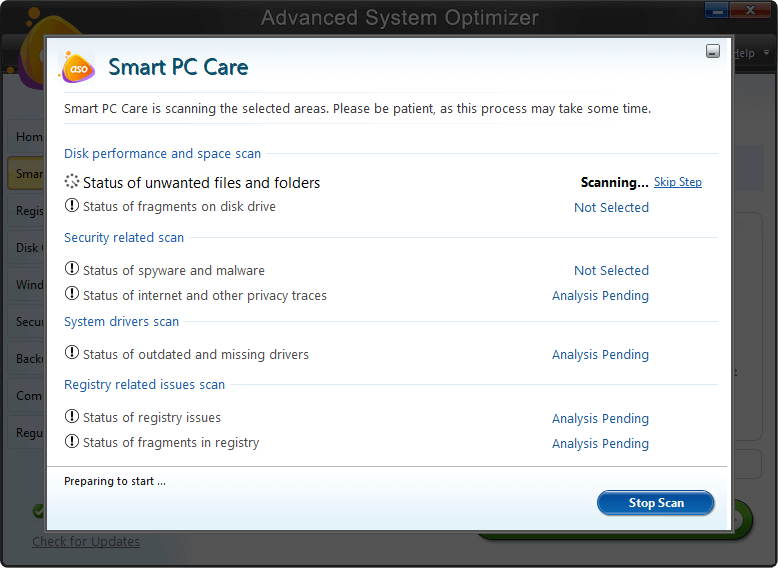Has it ever happened that as soon as you tried to log into a new user account, you received a message saying “low system resources on Windows”? If yes, then do check out the fixes that we have discussed in this post. These fixes have also proved helpful for those users who have experienced stuttering Zoom audio combined with an error message – Low system resources may affect your audio quality. Try closing some applications to improve performance.
Probably Reasons Behind Low System Resources on Windows 10/11
Before you try out the manual ways to fix your computer which is low on system resources, you can try a third-party Windows optimizer and cleaning tool like Advanced System Optimizer which can help you with many of the above-mentioned ways. To get to know the tool inside-out, you can check out our review of Advanced System Optimizer. And, if you want to see how you can improve performance using Advanced System Optimizer, you can check out this post.
Let’s briefly look at how this Windows optimization tool can help you preserve system resources.
– Smart PC Care
Smart PC Care conducts essential system scans, identifies various issues such as scanning for outdated drivers and helps you remove them in one click.


– System Cleaner
Corrupted or unwanted system files are a bane of your computer’s existence. But, worry not! System Cleaner can help you fix those unwanted files. You can find this feature by clicking on Disk Cleaner & Optimizers from the left-hand pane and then clicking on
System Cleaner
Plus, there are tons of other features in Advanced System Optimizer that can help you safeguard your system resources and thereby help apps and system per se function properly.
Fix: Low System Resources On Windows 11
1. Close All Programs
Programs running on your computer use your system’s resources. So, it goes without saying that if your Windows 10 or 11 is low on the system’s resources, you should close all the apps except for the one in use. Especially if your end goal is to log into another user account or if you are facing Zoom audio stuttering, you should first check that all the other programs are closed.
2. Disable Background Processes
Apps running in the background hog on your system’s resources. So, suppose you are encountering issues in logging in as another user, facing audio issues in an application like Zoom, or facing other glitches while using an app that plays video content. In that case, you can opt for a clean boot on your computer and disable irrelevant background processes –
1. Press Windows + R to open Run . When the dialog box opens, type msconfig and hit the Enter key.
2. Uncheck the Load startup services under the Selective Startup radio button.
3. From the tabs on the top, click on Services.
4. Click on the checkbox that says Hide all Microsoft Services
5. Click on Disable all.
6. Go to the tab that says Startup and click on the button titled Open Task Manager.
7. Select the apps you want to disable on the Start and click Disable.
Now, try logging in as a different user or check if the program which was earlier not functioning properly is functioning correctly or not.
3. Update Display Drivers
Applications like Zoom significantly impact graphics card drivers. Here you must have the latest or updated graphics drivers because outdated drivers can cause “Low system resources” on Windows 11/10. If you are new to updating drivers on Windows, we have covered an in-depth post on how you can update drivers in Windows. So, go ahead, update drivers and check if you have been able to resolve the issue at hand.
4. Perform SFC and DISM Scans
Corrupt system files can impair the functionality of apps on your computer. Moreover, if the system files related to your chosen user account are corrupt, you won’t be able to log in. Therefore, a simple SFC and DISM scan using the Command Prompt may help you fix the issue.
To perform both scans, here are the steps mentioned below –
1. Type cmd in the Windows search bar and click on Run as administrator from the right-hand side.
2. When the Command Prompt opens, first type sfc /scannow and hit the Enter. What this would do is it will replace corrupted system files with healthy ones. Once the scan is over, check if you are still getting the error.
3. Even if the SFC command doesn’t help resolve the issue, open another administrative Command Prompt using the above steps and type –
DISM.exe /Online /Cleanup-image /Restorehealth
4. Restart your computer and check if you have been able to resolve the issue.
5. Mute Other Participants’ Audio
Since the issue at hand is faced by people conducting Zoom meetings, one option is to mute the audio. That means you can mute other participants because if many participants are using the audio simultaneously, it may also affect your system’s resources.
Wrapping Up
Hope that these solutions have worked for you and that you have been able to fix the “Low system resources on Windows 11/10” while using apps like Zoom or trying to create another user account. For more such useful troubleshooting content, keep reading WeTheGeek.
